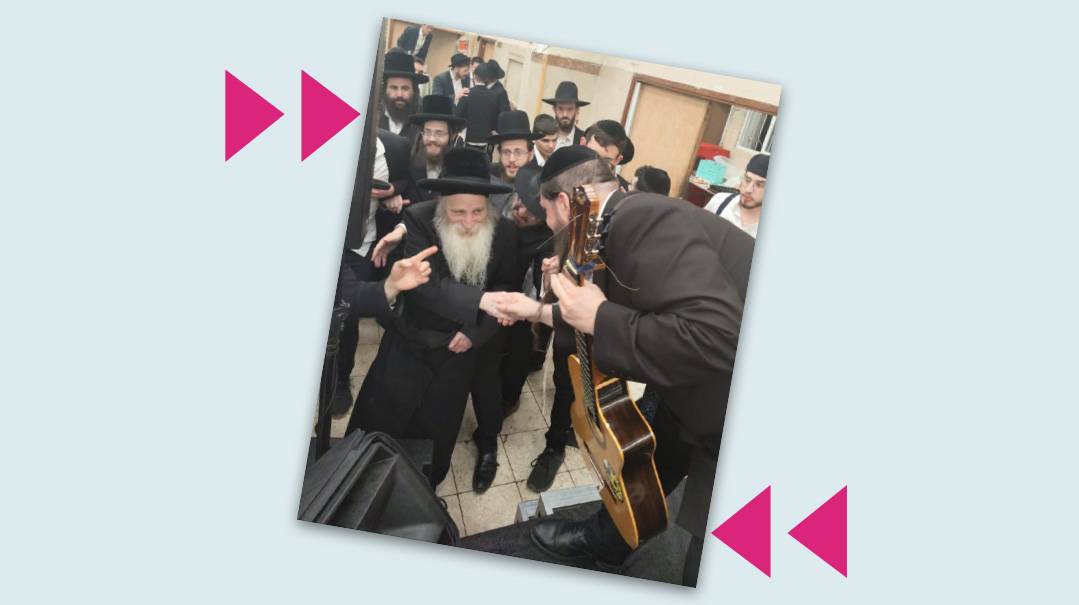Get Rid of That Sadness
| April 1, 2025Just Out — New Releases, Fresh Takes

Get Rid of That Sadness
You’d think that Purim is the perfect occasion to release a singable, danceable album. So why did Joey Newcomb decide to release his latest creation, FREILACH ALL THE TIME a few days later?
“This album was over two years in the making,” Joey says. “It was a challenge to find time when both producer Doni Gross and I were available to work in the studio. Or maybe it was the yetzer hara getting in the way of all the chizuk we could spread to Yidden. When it was finally all ready, it was already Purim time, but we waited to release it, because our message is that the simchah is not a one-day event, but has to continue throughout the year.”
Joey wrote the title track, “Freilach All the Time,” when he was feeling a bit low one day last summer. “I wasn’t feeling like myself, and I remembered that there is a principle taught by Rebbe Nachman of Breslov that if you’re not feeling upbeat and you don’t know why, you have to do whatever it takes to get rid of the sadness and be b’simchah in the embrace of Hashem. So right where I was, there in my shvigger’s backyard, I started to run around the pool and sing aloud, ‘Ivdu es Hashem b’simchah.’ I managed to shake off that low mood and then discovered that I was humming to the tune of this song.”
The track is a high-energy duet with Benny Friedman, with Yiddish and English words and a relatable happy vibe.
As always, Joey’s compositions offer a variety of moods. His special ability to tune into the heart of his own experiences and express those feelings and encounters in niggun is on full display. The “Slabodka Niggun,” for example, was written while he was standing outside the building of the famed Slabodka yeshivah while on a tour of Kovno, Lithuania.
“We were talking about various mussar ideas, so we started to quote Mesilas Yesharim, and this tune emerged. When we were recording it, it occurred to me that it would be nice to sing this with Naftali Kempeh. We’ve never sung together before, but we’ve had many conversations, and he likes to tell me that he’s a litvisher Yid.”
When Naftali received the song from Joey, he immediately connected to it and agreed to sing. In addition to the song, these new partners are also working on a music video together.
“Ka’eileh,” released as a single in April 2024, reappears on this album. On the surface it’s whimsical and light, a song about the word and distinctive trop from the maftir of the Shalosh Regalim that everyone, for some reason, likes to sing aloud with the baal korei. But Joey explains that there is always something deeper behind even the simplest things.
“When I was thinking about how we sing it out loud with the baal korei when he’s trying to lein, I thought, what’s the internal, neshamah reason behind the funny things we Yidden do? What’s the avodah of ‘Ka’eileh?’ It can’t just be the catchy trop. ‘Ka’eileh’ refers to the korbanos like the ones you’ve already brought — in other words, something that you’re doing again, even though you’ve done it already. Now, how do we keep up the excitement, the freshness, if we’ve already done it?”
And so, the song concludes with “One more message if I may / Ka’eileh means like yesterday / The same korbanos that you’ve brought before / Well, here’s something about the Jew / He always keeps things fresh and new / So we’ll scream it out like we never did before… Ka’eileh!”
Never one to balk at originality, Joey included a set, “The Making of Mazel Tov” and “Mazal Tov,” the voice notes and final recording of a niggun Joey composed together with Doni Gross in honor of the birth of a son to a good friend who’d waited for several years. Then there’s Elimelech Blumstein’s, “If not for the Torah, I’d be a regular Joe,” based on the Gemara that quotes Reb Yosef as saying, “If not for this day, I would just be another Yosef walking around the market.” The bridge of this song features a rock ‘n’ roll style electric guitar solo which seems to illustrate the Joe he would be “if not for the Torah, if not for the avoidah.”
Back In Time
Some songs never seem to get old. Which songs from years ago are you seeing making a comeback these days?
Menachem Herman
“Samcheim!” It’s a good old MBD favorite that’s now back in style.
Sruly Werdyger
“Ki Lashem” from Regesh is back in, along with some other Regesh songs.
Meyer Adler
Reb Chaim Banet’s “Meheira Hashem Elokeinu” is picking up again at weddings.
Yidi Bialostozky
Since the Shirasa album came out and brought some of Reb Ben Zion Shenker’s old songs to the new generation, his “Mimkomcha” has become very popular. But I don’t know if it’s making a “comeback,” because it was never released for the public originally.
Rabbi Shloime Taussig
“Habeit” by Abie Rotenberg is being sung a lot lately, much more than in the past, very possibly due to the situation in Eretz Yisrael and the world. The London School of Jewish Song repertoire was always around, but it seems that people are singing those songs more lately, since the passing of Yigal Calek. As a lover of oldies, I always try to blend in some old London or Tzlil V’zemer, Dveykus, Pirchei, or Rabbis’ Sons somewhere into the evening’s playlist. Another one that’s come back up recently is “Modim Anachnu,” composed by Yossi Green as the title track on my first album, 16 years ago. I keep getting clips of singers singing that song.
(Originally featured in Mishpacha, Issue 1056)
Oops! We could not locate your form.






